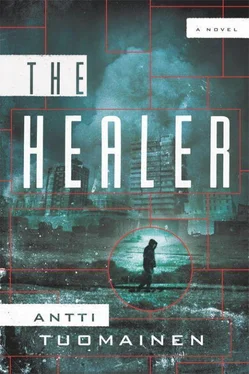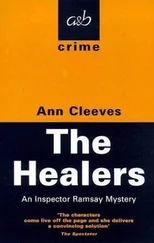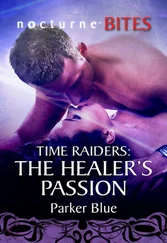“Did Johanna know about this?” I asked. “About Pasi Tarkiainen?”
Jaatinen leaned back and sized me up again, me and the whole situation.
“Probably not. Unless she found out through her own research. Our department’s not as airtight as it used to be. After all, here I am talking to you. But did she know? I don’t think she knew.”
I shifted my position in the chair, trying to throw my left leg over my right, but the pain in my lower back stopped me like a wall. It was as if someone had taken a screwdriver directly to the nerve. I let out a squeak and put the leg back where it was before.
“Do you know who they were?” Jaatinen asked.
“The ones who clobbered me?”
He nodded. In a friendly way this time, I thought. I shrugged. It was of absolutely no importance, I thought. “If I had to guess, I’d say they were from some private security company, paid professional sadists. There are still people living in those houses, and they can afford to pay someone to keep the place clean.”
“The only sector that’s growing,” Jaatinen said. “We’ve had a lot of people defect. They want to try to earn enough to go north. But the space up there isn’t unlimited. And life up north can’t be much easier or more delightful than it is here.”
I had to get the discussion back on track. I was looking for Johanna, not pondering convulsions in the labor market.
“Let’s assume that you could investigate the Healer and Tarkiainen,” I said. “Where would you begin?”
Jaatinen seemed to have expected this question. He didn’t think for even a second before saying, “I’d look for Tarkiainen. Dead or not.”
“How?” I asked.
“With the information you have, some instinct, and a bit of luck. You’ll need all of it. The evidence indicates that Tarkiainen is alive. Somewhere there are people who know him. I’d be surprised if they weren’t right around the corner. I have a feeling the killer knows the areas he’s active in very well. The same would apply to the people around him. I would look for old friends of his—workmates, neighbors, golf buddies, kindred spirits. One of them might still be in contact with him. He might even go to the same pub he used to.”
Jaatinen was quiet for a moment and seemed to purposely leave the obvious question hanging in the air.
“You don’t believe that Tarkiainen’s dead?”
He didn’t need to wrestle with his answer.
“No,” he said in a dry and implacable voice.
We talked for a few more minutes, and I had the feeling he was still keeping me at a distance. He had told me a lot, but not everything.
* * *
I DIDN’T PRESS HIM. Nor could I bring myself to ask him directly what he thought Johanna’s chances were, but we did talk about the kidnapping case three years earlier that she had helped to solve, thanks to which two girls, aged six and eight, though permanently traumatized, had been returned alive. I could tell that Jaatinen hoped this chat would encourage me. I did my best to accept whatever crumbs I could get from it.
After a moment of silence, he got up and pulled up his dark suit pants. I did the same with my jeans. There was another sharp pain in my back. We shook hands and I thanked him for his time. He said, “We’ll keep trying,” and I said, “Yes we will.” We were at the door before his choice of words registered.
I turned to him and asked, “Why do you keep trying?”
For a moment, he didn’t look like Dr. Phil. He looked like someone else—maybe himself.
“Why,” he said. It was more a statement than a question.
His face had a look that was familiar by now, the faintest trace of a little joy—or was it annoyance?
“There’s still a chance to do more good than harm here. And I am a policeman. I believe in what I do. Until I have evidence to the contrary.”
“You’re the strangest person I know,” Johanna once said as she came and rested her hands on the back of my neck. “You can sit there for hours staring at emptiness and still look completely focused.”
“That’s just it,” I answered, rousing myself from my thoughts. “I’m not staring at emptiness. I’m working.”
“Take a break once in a while,” she said with a laugh. “So you don’t wear yourself out.”
She swung herself astride my lap, her legs dangling above the floor, and pressed her lips against mine for a long time, then laughed again.
Life’s most significant moments are so fleetingly short and so much a matter of course when they’re happening that they’re greeted with a grunt or a smile. It’s only later that you realize you should have said something, been grateful, told a person you love her. I would have given anything now to feel Johanna’s gentle hand caress my face or her warm, full, almost dry lips on my temple.
I sat in the backseat of the taxi exhausted, staring into the dark, and didn’t like what I was thinking. Hamid asked where to. Nowhere yet, I answered. I needed a minute to breathe. So we sat in the car in the dark, not far from the Pasila police station. Hamid turned up the heat, then turned it down. It seemed balance was a challenge even in this task.
The rain was so soft and light now that you didn’t realize it was a cold winter rain until you were soaked through and shaking with the chill. The digital clock made to look analog on the dashboard said it was half past two. Hamid moved his lips in time to the softly playing music, glanced at me in the rearview mirror, fiddled with his phone, and was clearly bored. I opened my phone to the map Johanna had made.
Tapiola, Lauttasaari, Kamppi, Kulosaari.
Tuomarinkylä, Pakila, Kumpula, Töölö, Punavuori.
West–East / North–South.
I searched for information on Pasi Tarkiainen, but everything I found was more than five years old. There were at least four former addresses: in Kallio, Töölö, Tapiola, and Munkkiniemi. He had worked at doctor’s offices in Töölö, Eira, and right downtown, on Kaivokatu.
I remembered what Jaatinen had said. I looked through the lists again. Töölö was on every one of them.
I did an image search, too. The picture was from ten years ago. The young Pasi Tarkiainen didn’t look like a murderer. He looked happy, like a bright, optimistic medical student. His smile was so infectious that I almost smiled back. But when I looked closely at the photo, I saw something else. The eyes behind the glasses were ever so slightly mismatched to the dimples in his glowing cheeks. They were older than the face that surrounded them—serious, nervous even. His light hair was short, gelled, and styled in sawtooth bangs. In spite of his broad smile he looked like a man who took things very seriously.
I put down the phone and leaned against the headrest. For a moment I was somewhere else. Closing my eyes was like a time machine. I could go anywhere, forward or back, in seconds.
Johanna.
Always and everywhere.
I opened my eyes and was back in a taxi with a North African driver, surrounded by rain.
I gave Hamid an address, and he pulled onto the road with relief. We descended the hill from Pasila toward the zoological gardens. The windows of the Aurora Hospital reflected bright spotlights like a long row of mirrors. The hospital was guarded by soldiers, particularly around the infectious disease clinic. There were rumors that the guards were there for two reasons: to keep the public out, and to keep the patients in. The same rumors spoke of Ebola, plague, a strain of diphtheria resistant to every treatment, tuberculosis, malaria. The trees of Keskuspuisto formed a wall of gloom behind the hospital. There was no reliable count of how many people were living in the park, permanently or temporarily. The highest estimate was ten thousand. It was as good a guess as any.
Читать дальше












